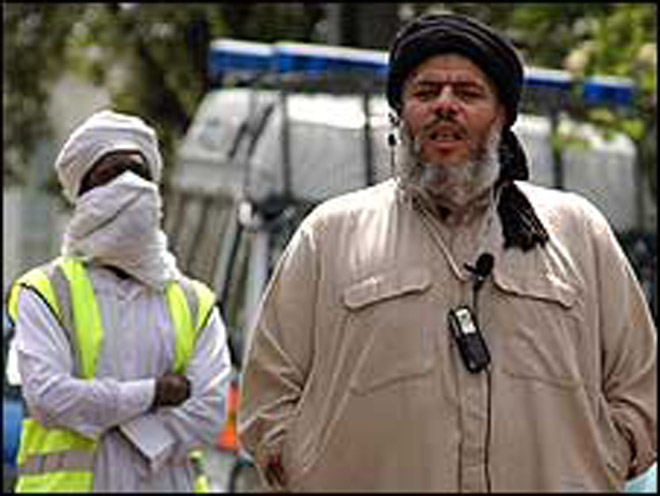Radical Muslim cleric Abu Hamza and four of his associates in Britain Monday lost their latest appeal against extradition to the US and can be handed over to the US authorities, according to a ruling Monday, DPA reported.
The European Court of Human Rights in Strasbourg, France, said it had rejected an appeal by Hamza against an earlier ruling in April that extradition to the United States would breach his human rights.
The Egyptian-born cleric, 54, first came to Britain in 1979. He has spent time in and out of prison and fought a long battle over extradition to the US on terrorism charges. He was first arrested in Britain at the request of the US in May, 2004.
Hamza, distinctive for his hook prosthesis on his right hand and a lost eye - was notorious for the fiery speeches he held as imam of Finsbury mosque, in London - and in the street outside - for many years.
The decision means that Hamza, who was jailed for seven years in Britain for soliciting to murder and inciting racial hatred, will be extradited with four other men. They include Babar Ahmad, a terrorism suspect who has been held in jail in Britain without trial for eight years.
Britain's Home Secretary Theresa May welcomed the decision by the Strasbourg court not to refer the cases to the court's Great Chamber.
"We will work to ensure that the individuals are handed over to the US authorities as quickly as possible," she said in a statement. The men are likely to be put on a plane to he US within two or three weeks, British sources said Monday.
The charges laid against Hamza in the US include hostage-taking in Yemen in 1998, advocating violent jihad in Afghanistan in 2001, and conspiring to establish a jihad training camp in Bly, in the US state of Oregon, between 2000 and 2001.
Ahmad is suspected by the US of supporting and fundraising for terrorism. The other cases involve Seyla Talha Ahsan, Adel Abdul Bary and Khaled al-Fawwaz, who are all accused of having been being aides to the late Osama bin Laden in London.
While Ahsan was indicted as Hamza's "co-conspirator," Bary and al-Fawwaz were indicted for their alleged involvement in, or support for, the bombing of US embassies in Nairobi and Dar es Salaam in 1998.
The unanimous judgement from Strasbourg said there would be no human rights breach either as a result of likely detention in ADX Florence "supermax" prison in Colorado, or the length of possible sentences on conviction.
The judges acknowledged that, in the US, Bary faced 269 mandatory sentences of life imprisonment without the possibility of parole, while Ahmad, Ahsan, Hamza and al-Fawwaz faced "discretionary" life sentences.
"Having regard to the seriousness of the offences in question, the court did not consider that these sentences were grossly disproportionate or amounted to inhuman or degrading treatment," the judges ruled.






